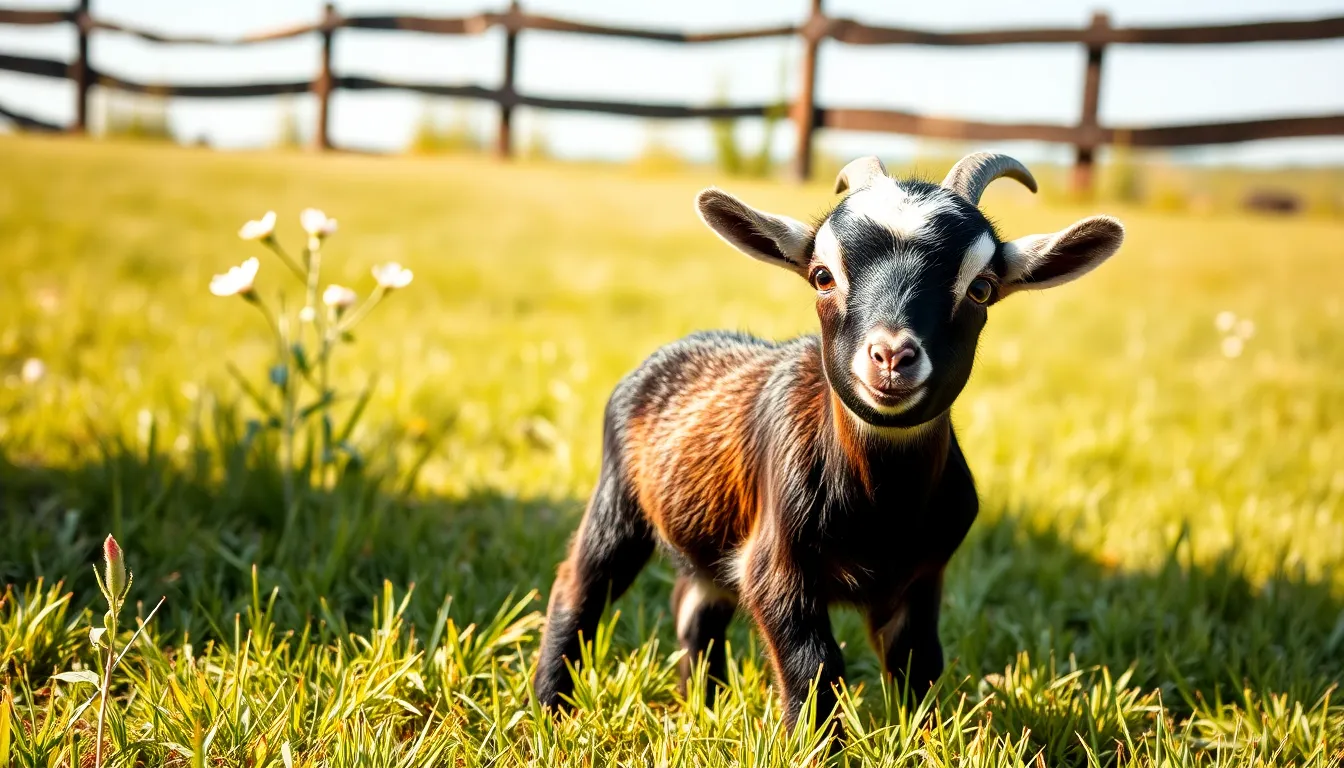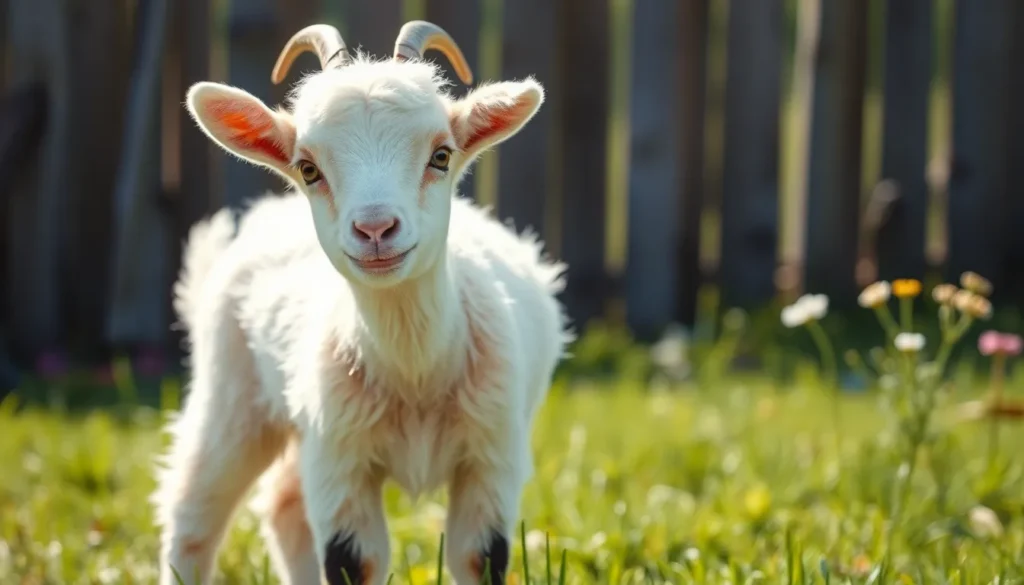Thinking about adding a baby goat to the family? You’re not alone! These adorable creatures have captured hearts all over the world with their playful antics and charming personalities. But before jumping into the goat game, it’s important to know what you’re getting into—especially when it comes to the price tag.
Table of Contents
ToggleFactors That Influence Baby Goat Prices
Several factors affect the price of baby goats. Understanding these elements helps potential owners make informed decisions.
Breed Variations
Different goat breeds command varying prices. Popular breeds like Nigerian Dwarfs and Boer goats often fetch higher prices due to their desirable traits. Specialty breeds may require more investment, while common breeds can be more affordable. The genetics and lineage of a breed also contribute to its price, with purebred goats typically costing more. Considerations include demand for specific breeds and the availability within local markets.
Age and Health
The age and health status of a baby goat play significant roles in pricing. Younger goats tend to be more expensive, particularly those just weaned, as they’re often in higher demand. Healthy goats also command premium prices, reflecting their better growth potential and productivity. Sellers frequently provide health records to demonstrate a goat’s condition, influencing buyers’ willingness to pay. Vaccination status and any known health issues further impact individual goat prices.
Location and Market Trends
Location significantly influences baby goat prices due to regional demand. Areas with established goat farming traditions often see different price ranges compared to urban settings. Market trends fluctuate based on seasonal supply and demand; prices may rise during spring when many goats are born. Local agricultural fairs can also sway prices, offering both buyers and sellers opportunities to assess market conditions. Regional preferences for specific goat types can dictate overall pricing trends.
Average Costs of Baby Goats

Baby goat prices vary significantly, influenced by several factors including breed and market trends. Understanding these costs helps potential owners prepare for the financial commitment.
Pricing Ranges by Breed
Prices for baby goats can range widely based on breed. Nigerian Dwarfs typically cost between $200 and $400 each, known for their friendly disposition and small size. Boer goats tend to fetch higher prices, generally between $300 and $600, valued for their meat production qualities. Other breeds, like pygmy goats, exhibit pricing from $150 to $300, appealing to buyers looking for compact companions. Differences in breeding quality and lineage can further affect these prices, with show-quality animals commanding premium rates.
Seasonal Price Fluctuations
Prices for baby goats often fluctuate throughout the year. Spring sees a surge in availability due to breeding cycles, resulting in generally lower prices. During fall, demand may rise as owners prepare for winter, potentially increasing costs. Local agricultural events can also contribute to price shifts, with festivals showcasing goats often leading to higher prices due to increased interest. Recognizing these seasonal trends can help buyers find the best deals while deciding on their next addition to the family.
Additional Expenses to Consider
Owning a baby goat involves several ongoing costs beyond the initial purchase price. Potential owners must factor in expenses such as feed, veterinary care, and housing.
Feed and Nutrition
Quality feed and nutrition play a crucial role in keeping goats healthy. A balanced diet often includes hay, grains, and specific minerals. Monthly feed costs typically range from $40 to $100, depending on the number of goats and their dietary needs. Owners need to ensure goats receive the right nutrients to promote growth and prevent health issues. Access to pasture can reduce feed costs significantly, but adequate feed remains essential for overall wellbeing.
Veterinary Care
Regular veterinary care is essential for maintaining a goat’s health. Routine vaccinations, deworming, and health checks can add up quickly. Annual veterinary costs usually range from $100 to $300 per goat, varying with the services required. Owners must also be prepared for unexpected health issues that may arise, potentially increasing veterinary expenses. Investing in preventative care can lead to significant long-term savings and healthier goats.
Housing and Equipment
Providing suitable housing and equipment is vital for the comfort and safety of baby goats. A simple shelter can cost between $200 and $500, depending on size and materials used. Essential equipment, such as feeding troughs, water buckets, and bedding, further adds to initial setup costs. Regular maintenance of housing and equipment is necessary to ensure a safe environment. Proper housing protects goats from harsh weather and predators, contributing to their overall health and happiness.
Where to Buy Baby Goats
Potential goat owners can explore various options for purchasing baby goats. Understanding the distinctions between breeders and rescues assists in making informed decisions.
Breeders vs. Rescues
Breeders specialize in producing specific goat breeds like Nigerian Dwarfs and Boer goats. They typically price their goats based on pedigree and demand. Rescues focus on saving goats in need, often offering lower adoption fees. Some rescues may charge from $50 to $150, which includes vaccinations and spaying or neutering. Each choice has its advantages. Breeders provide healthier, well-bred goats, while rescues offer support for vulnerable animals. Choosing between them depends on preferences for breeding and animal welfare.
Online Marketplaces
Online marketplaces present a convenient way to find baby goats. Websites like Craigslist, Facebook Marketplace, and specialized agricultural platforms connect buyers with sellers. Prices on these platforms vary widely, with listings typically ranging from $100 to $600, influenced by breed and location. Direct communication with sellers often reveals more about the goats’ health and history. Local pickup is essential, as it ensures the buyer can assess the goat’s condition before purchase. It’s wise to check for reviews of the seller or platform to ensure a positive transaction.
Owning a baby goat can be a rewarding experience filled with joy and companionship. However it’s essential to approach this decision with a clear understanding of the financial responsibilities involved. From the initial purchase price to ongoing costs like feed and veterinary care, potential owners should be prepared for a commitment that goes beyond just the upfront investment.
Whether choosing to buy from a breeder or adopt from a rescue the decision should align with one’s lifestyle and values. With proper research and planning anyone can enjoy the delightful presence of a baby goat while ensuring its well-being and happiness.





